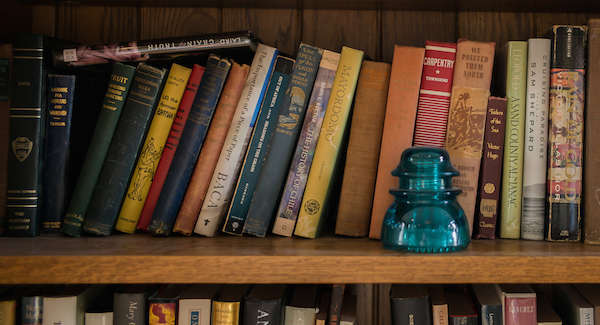Stanley Crawford gave me the idea. In his essay, "A Farmers Bookshelf" he describes the books and magazines that inhabit his shelves and are important to his life as a writer, activist and farmer living in Northern New Mexico.

After finishing Mr. Crawford's essay I looked at my small oak bookcase and thought about how it has changed over the years. In the past, I had bookcases stuffed full of books, both read and unread. When the cases were full, the books found a spot on the floor, were piled on my nightstand or tucked into nooks throughout the house. Over time, the clutter and disorganization overcame my love of living among piles of books and we had a garage sale. The sale was a success, with my books bought by a used book seller trying to keep his shelves full and his register ringing.
About the same time as the rummage sale, I was given an electronic reader. With only a small bookcase and what seems like unlimited storage on my reader, the number of physical books I own grows at a slow pace. In theory, I keep books that strike a special note, justifying a physical copy to allow the leisurely turning of pages. The books on my shelves represent subjects that are important to me. As a result, a tour of my bookcase should tell me something about myself and illuminate topics that have captured my imagination over the years.
In the upper left hand corner of my bookcase are old books, some coming to me from family and some that I found in used book stores. The vintage, but torn, copy of Treasure Island and The Short Stories of Jack London from my dad. The silly stories of H. Allen Smith and the beautiful and naive Waterless Mountain about the Navajo from my mother. In this section there are also books handed down from my grandparents. Books about copper mining, carpentry and one unique book, "We Pointed Them North" about cattle drives in the old west. This tattered book contains a handwritten note by my great-grandfather W.R. McGinnis, a true cowboy who drove cattle north from Texas, before settling in Montana. Classic novels, agricultural books, and wood-lore complete the old book section. I keep these books out of sentimentality and occasionally leaf through or read sections for the nostalgia secure within their pages.
Next to the old book section is the area occupied by Mr. Crawford. His books "Mayordomo," "The Garlic Testament" and "The River in Winter" tell about living close to the land and explore the limits of our resources. Wendell Berry's books also live in this section as do those by Charles Fergus. These authors are old friends that ask questions about land and community. Simple questions with complex answers. Close cousins to Crawford and Berry, on the bookshelf and in attitude are the naturalists, conservationists and environmentalists. Craig Childs, Mary Austin, Edward Abbey, John Wesley Powell and Aldo Leopold. Writers who have helped shape my thinking about the natural world and the ripple effect of our actions. John Muir should be present, but I lent his books out years ago hoping to spread his love of the untamed.
Near the bottom of my bookcase, you can find the books that deal with politics, history and world leaders. Discussions about financial crises, explanations of wars and dissections of politics inhabit this area. Tibet, Afghanistan, Iraq, Africa, the mid-east, immigration and the crash of 2008, make the list as do biographies of Nelson Mandela, Georgia O'Keffe, Andrew Wyeth and John Wooden. Books that I turned to searching for knowledge of a complicated world. It remains an open question whether an understanding of events and those who shaped them has helped me chart a coherent course in life or if my time would have been better spent enjoying a good novel.
Speaking of novels, sprinkled throughout the bookcase are stories and adventures that were too good to be given away. The list includes classics by Hemingway and Steinbeck, but you will also find Larry Watson, Jim Harrison, Norman Maclean, Victor Villasenor, John Nichols and Tom McGuane. Writers who have kept me company through many a long evening or Sunday afternoon and continue to fuel my love of the American west.
One other type of book can be found in my bookcase. This group deals with faith or the lack of it. The basic tenets of Buddhism, Christianity, Judaism and Islam occupy this section, as do the journeys of individuals searching to come to terms with their own faith. Multiple tomes explaining or debunking religion are also tucked into this most disorganized area of my bookcase. Searching for clarity in books about spirituality has led to contradictions and ultimately to confusion about a journey I believe is best traveled alone.
At the beginning of this essay, I suggested that a tour of my bookcase would provide personal insight as I enter my seventh decade. Unfortunately, as I complete the catalog it's clear that any revelations are buried deep within the clutter of both my bookcase and my mind. Additional concentration and meditation is definitely needed if I am to arrive at any expanded insight. Understanding that I am falling short of Mr. Crawford's example, but not being particularly good at self reflection, I think I'll grab a book, call in the dogs, open a window and spend the afternoon reading.
